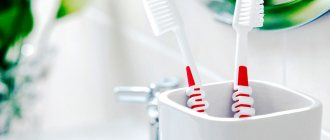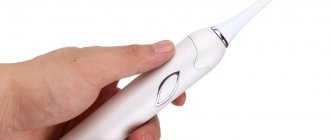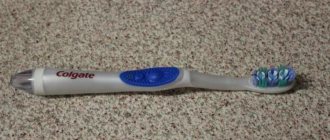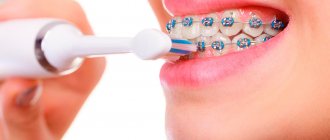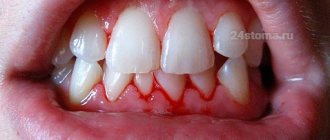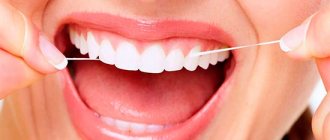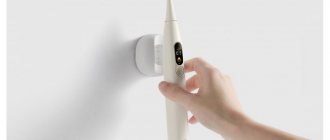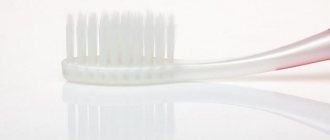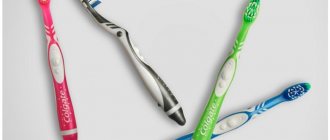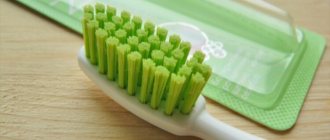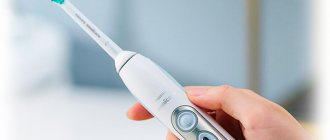A toothbrush is a device that every person has for personal use today. This is an indisputable fact and an absolutely integral attribute, without which it is quite difficult to imagine a comfortable life. Perhaps today, even every child understands that timely and systematic brushing of teeth is the key to oral health. Accordingly, it is quite obvious that the main cleaning tool - a brush - must be of high quality, in good condition, and also correctly selected.
Not only the quality of teeth cleaning, but also their immediate health and the condition of the enamel depends on the toothbrush used. Therefore, it is very important to know how to choose the right brush and what nuances to pay attention to during the selection process. But the market for such devices today is replete with not only brand names, but also types of devices, because brushes have long been not simple, but electric. And today we will try to figure out which toothbrush is better, electric or regular.
Regular toothbrush
Of course, the most common brushes today are the most common devices. Obviously, this trend is primarily observed due to the significantly lower cost compared to electric toothbrushes. However, simple brushes are presented in such an assortment that it often becomes very difficult for the average person to make a choice, because the number of parameters and characteristics inherent in brushes is almost endless. Let's understand the main aspects that you should pay attention to when choosing the best toothbrush for your individual use.
Hardness level
One of the fundamental and most important parameters of toothbrushes is the level (degree) of hardness. It is important to emphasize that this factor is important, regardless of whether you are using an electric toothbrush or a regular one.
There are several main degrees of rigidity:
- Very soft. Intended for use by children with baby teeth. These brushes are also an ideal choice for adults suffering from gum or dental disease. If you have periodontitis or increased enamel sensitivity, this choice will be ideal;
- Soft. Such bristles will be an excellent assistant when used by people suffering from bleeding gums. In addition, doctors also recommend that pregnant and breastfeeding women use brushes with soft bristles. It is important to understand that you need to brush your teeth correctly, without pressing too hard;
- Medium level of hardness. The real standard, the most commonly used type of firmness, which is popular mainly among adults. If you consider your oral cavity to be completely or relatively healthy, choosing a medium-hard brush will be rational for you;
- Tough. Doctors recommend brushes with hard bristles only to those who regularly smoke or drink coffee, as well as to people exposed to heavy plaque. In other cases, use is not recommended;
- Very tough. This type of bristles on brushes is recommended by experts for cleaning removable dentures, as well as in cases of using dental braces and plates. It is these brushes that will allow you to clean the oral cavity with the highest quality and completeness.
Bristle material
Manufacturers offer toothbrushes with synthetic or natural bristles, so products can differ in functionality, efficiency and cost:
- Synthetic bristles: the raw materials used are nylon, setron or polyurethane, which can have different hardness levels and are hygienic and easy to care for.
- Natural bristles are safe and completely environmentally friendly, so they can be expensive. Natural fibers clean the oral cavity efficiently, but can absorb harmful microorganisms, making them impractical and requiring high-quality care and regular replacement.
Variety: therapeutic and prophylactic toothbrush
These brushes differ in that the bristles on them are located at different levels by default. In addition, it is also noted that such products often use villi of different hardness, this makes it possible to significantly better clean the space between the teeth, as well as get rid of plaque and food debris almost completely.
Often, therapeutic and prophylactic brushes are distinguished by the presence of rubberized or silicone inserts. They will allow you to massage your gums and tongue, as well as additionally polish the surface of your teeth.
Doctors recommend using such brushes for people with weakened gums, but a therapeutic and prophylactic brush will be the ideal choice for most people, even those who do not have problems with gums.
Does everyone need an irrigator?
First of all, it is needed by those who find it difficult to floss: people with orthodontic structures such as braces and implants, those who have not had their wisdom teeth removed and the space between the teeth is too small to clean with dental floss, and people with disabilities. An irrigator will also come in handy if your gums are sensitive and dental floss causes them to bleed.
Some data say that floss cleans the interdental spaces better, others say that an irrigator does. So the choice between a thread and an irrigator is more a matter of convenience
. You can even use both: this is the most effective way to remove plaque between teeth.
Working principle of an electric toothbrush
Since their appearance in the 60s until today, electric brushes have come a long way. And in the form in which we have the opportunity to observe and use them today, they work according to the following principle:
- The brush handle contains a battery or battery that supplies power to the moving element.
- The moving element begins to rotate when the corresponding button is pressed.
- The rotational movements of the element are transmitted to the toothbrush head, on which there is a round tip with brush bristles.
- The tip begins to rotate.
The main advantage of such a brush is that after setting the tip in motion, the user only has to move the brush from tooth to tooth with his hand - the brush does all the rest of the work on its own.
It is important to note that there is a second type of electric brushes, which has a slightly different operating principle. We are talking about ultrasonic electric brushes that work according to the following scheme:
- A battery or battery is inserted into the handle of the brush, as well as a special sound element.
- When you press the power button, the element begins to vibrate.
- Due to the reproduced vibrations, the fibers on the nozzle begin to move.
When using ultrasonic brushes, the user needs to brush their teeth themselves, however, due to the vibrations of the brush bristles, the cleaning procedure has a higher efficiency.
Should you brush your teeth before or after breakfast?
Better after: then the less food debris, bacteria and saliva on the enamel, the lower the risk of developing oral diseases. But you shouldn’t brush your teeth immediately after breakfast (or any other meal). First you need to rinse your mouth with water, wait an hour (or at least 30 minutes) - and only then start cleaning. Especially if you drank coffee or ate grapefruit: acidic food makes the enamel more vulnerable, and cleaning can harm it. If you don’t have time to take a long break between breakfast and oral hygiene (you need to run to work, for example), brush your teeth before breakfast.
Advantages of electric toothbrushes over regular ones
Of course, electric brushes also have a whole list of obvious advantages:
- Soft plaque is removed much easier than with a regular brush and in large volumes;
- Attracts children and makes them want to systematically brush their teeth;
- Ease of use;
- Ease of transportation.
Perhaps the only drawback of an electric toothbrush is its cost, which can reach very significant levels. However, it is quite possible to find an excellent option for 15-20 dollars, which can be used for more than one year.
How about cleaning your tongue? If yes, then with what?
Bacteria that cause tooth decay also multiply on the tongue. But there is no evidence that everyone needs to clean it. A study of 251 subjects found that brushing the tongue helps get rid of bad breath - halitosis.
. But there is no exact data on how often and for how long to clean your tongue, what technique to use.
Manufacturers offer special tongue scrapers
, which do not cause a gag reflex, and recommend brushing your tongue twice a day after brushing your teeth. You should start from the root of the tongue, where most bacteria accumulate. Using gentle pressure, you first need to move from the root of the tongue to its tip, and then treat the side surface, right and left.
How to choose an electric brush
Let us also note the nuances of choosing a device such as an electric toothbrush, because for the domestic buyer such a gadget is a kind of innovation, and if you decide to use it for the first time, questions and difficulties may arise during the selection process. When purchasing, you should pay attention to the following factors:
- Power source - it can be of two types: battery and accumulator. The rechargeable option is ideal because it allows you to save on the purchase of new batteries by charging from the standard station included in the kit. It’s easy to guess that the power of battery brushes is slightly higher. And greater power directly leads to better cleaning ability;
- The technology used for moving the nozzle is the number of movements that the brush head “can” make. This can be regular rotation in one direction, in two directions, or in two directions together with pulsating movements. Such technologies are called 1-D, 2-D, and, accordingly, 3-D;
- The number of attachments included - as you know, a regular toothbrush needs to be changed periodically. Experts recommend doing this once a month. As for electric brushes, the attachments on such devices change. Therefore, the issue of having additional attachments is important;
- Additional functionality - many manufacturers are trying to expand the functionality of their devices by introducing various innovations into them. They begin with additional modes for caring for gums and teeth, and end with interfaces such as Bluetooth, for example. Of course, you have to pay for such conveniences, so such functionality can be called a small advantage, and not an urgent need.
Ultrasonic and ion models
In the ultrasonic model, the movements of the bristles are ensured by the action of a piezocrystal, the charge on the faces of which leads to the appearance of internal vibrations (1.6 MHz) transmitted to the bristles. Simultaneously with mechanical cleaning of the enamel, the device acts on the teeth with ultrasound.
The difference in the degree of ultrasound absorption between bone tissue and dental plaque leads to detachment and removal of plaque.
Dental care with an ultrasonic brush has the following advantages:
- removal of dental plaque and pigmentation leads to a whitening effect;
- ultrasound has an antiseptic effect on the oral cavity;
- the medicinal components of toothpaste penetrate into tissues under the influence of ultrasound;
- The device gently cleans braces, dentures and sensitive areas.
The ion device contains a titanium dioxide rod in the handle. By creating different polarities between plaque and the surface of the teeth, the brush attracts plaque and cleanses the oral cavity of germs. Its long-term use reduces gum bleeding and enamel sensitivity.
Which toothbrush is better: electric or regular?
So we have come to the most important question, which is posed by many modern people who are thinking about switching to electrical devices, but have not yet made a final decision. Of course, an electric device is more comfortable to use. In addition, it is marked by a noticeably higher efficiency and higher quality work results. That is why we can safely say that an electric toothbrush is superior in its capabilities to a regular one.
However, there is one parameter in which the innovative device is inferior to the “good old” brush - price. It is quite obvious that the cost of a regular brush is much more acceptable.
As for the need to periodically replace brushes, of course, no one has canceled it. However, replacement heads for most popular electric brushes today cost about the same as a new, quality regular toothbrush. In this aspect, both types of products are equal.
In general, as we have already said, buying an advanced electric brush is a completely rational decision, but whether it makes sense to give preference to an electric toothbrush instead of a regular one is up to you to decide.
